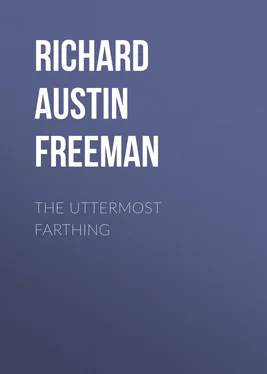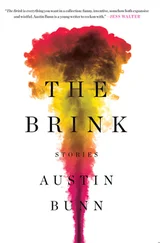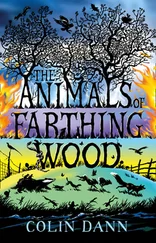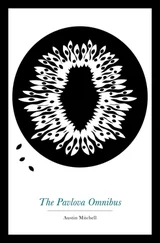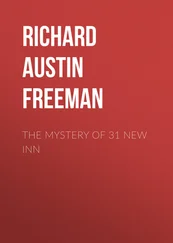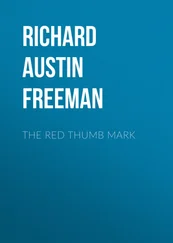Richard Austin Freeman - The Uttermost Farthing
Здесь есть возможность читать онлайн «Richard Austin Freeman - The Uttermost Farthing» — ознакомительный отрывок электронной книги совершенно бесплатно, а после прочтения отрывка купить полную версию. В некоторых случаях можно слушать аудио, скачать через торрент в формате fb2 и присутствует краткое содержание. Жанр: foreign_prose, Классический детектив, foreign_detective, foreign_antique, на английском языке. Описание произведения, (предисловие) а так же отзывы посетителей доступны на портале библиотеки ЛибКат.
- Название:The Uttermost Farthing
- Автор:
- Жанр:
- Год:неизвестен
- ISBN:нет данных
- Рейтинг книги:3 / 5. Голосов: 1
-
Избранное:Добавить в избранное
- Отзывы:
-
Ваша оценка:
- 60
- 1
- 2
- 3
- 4
- 5
The Uttermost Farthing: краткое содержание, описание и аннотация
Предлагаем к чтению аннотацию, описание, краткое содержание или предисловие (зависит от того, что написал сам автор книги «The Uttermost Farthing»). Если вы не нашли необходимую информацию о книге — напишите в комментариях, мы постараемся отыскать её.
The Uttermost Farthing — читать онлайн ознакомительный отрывок
Ниже представлен текст книги, разбитый по страницам. Система сохранения места последней прочитанной страницы, позволяет с удобством читать онлайн бесплатно книгу «The Uttermost Farthing», без необходимости каждый раз заново искать на чём Вы остановились. Поставьте закладку, и сможете в любой момент перейти на страницу, на которой закончили чтение.
Интервал:
Закладка:
Thereafter I called to see him every day and settled him to rest every night. His disease made more rapid progress even than I had expected; but he was always bright and cheerful, never made any complaint and never again referred to his troubled past.
One afternoon I called a little later than usual, and when the housemaid opened the door I asked her how he was.
"He isn't any better, sir," she answered. "He's getting most awful fat, sir; about the head I mean."
"Where is he now?" I asked.
"He's in the dining-room, sir; I think he's gone to sleep."
I entered the room quietly and found him resting by the table. He was wrapped up in his rugs and his head rested on his beloved monograph. I walked up to him and spoke his name softly, but he did not rouse. I leaned over him and listened, but no sound or movement of breathing was perceptible. The housemaid was right. He had gone to sleep; or, in his own phrase, he had passed out of the domain of sorrow.
II
"NUMBER ONE"
It was more than a week after the funeral of my poor friend Humphrey Challoner that I paid my first regular visit of inspection to his house. I had been the only intimate friend of this lonely, self-contained man and he had made me not only his sole executor but his principal legatee. With the exception of a sum of money to endow an Institute of Criminal Anthropology, he had made me the heir to his entire estate, including his museum. The latter bequest was unencumbered by any conditions. I could keep the collection intact, I could sell it as it stood or I could break it up and distribute the specimens as I chose; but I knew that Challoner's unexpressed wish was that it should be kept together, ultimately to form the nucleus of a collection attached to the Institute.
It was a gray autumn afternoon when I let myself in. A caretaker was in charge of the house, which was otherwise unoccupied, and the museum, which was in a separate wing, seemed strangely silent and remote. As the Yale latch of the massive door clicked behind me, I seemed to be, and in fact was, cut off from all the world. A mysterious, sepulchral stillness pervaded the place, and when I entered the long room I found myself unconsciously treading lightly so as not to disturb the silence; even as one might on entering some Egyptian tomb-chamber hidden in the heart of a pyramid.
I halted in the center of the long room and looked about me, and I don't mind confessing that I felt distinctly creepy. It was not the skeleton of the whale that hung overhead, with its ample but ungenial smile; it was not the bandy-legged skeleton of the rachitic camel, nor that of the aurochs, nor those of the apes and jackals and porcupines in the smaller glass case; nor the skulls that grinned from the case at the end of the room. It was the long row of human skeletons, each erect and watchful on its little pedestal, that occupied the great wall-case: a silent, motionless company of fleshless sentinels, standing in easy postures with unchanging, mirthless grins and seeming to wait for something. That was what disturbed me.
I am not an impressionable man; and, as a medical practitioner, it is needless to say that mere bones have no terrors for me. The skeleton from which I worked as a student was kept in my bedroom, and I minded it no more than I minded the plates in "Gray's Anatomy." I could have slept comfortably in the Hunterian Museum—other circumstances being favorable; and even the gigantic skeleton of Corporal O'Brian—which graces that collection—with that of his companion, the quaint little dwarf, thrown in, would not have disturbed my rest in the smallest degree. But this was different. I had the feeling, as I had had before, that there was something queer about this museum of Challoner's.
I walked slowly along the great wall-case, looking in at the specimens; and in the dull light, each seemed to look out at me as I passed with a questioning expression in his shadowy eye-sockets, as if he would ask, "Do you know who I was?" It made me quite uncomfortable.
There were twenty-five of them in all. Each stood on a small black pedestal on which was painted in white a number and a date; excepting one at the end, which had a scarlet pedestal and gold lettering. Number 1 bore the date 20th September, 1889, and Number 25 (the one with the red pedestal) was dated 13th May, 1909. I looked at this last one curiously; a massive figure with traces of great muscularity, a broad, Mongoloid head with large cheekbones and square eye-sockets. A formidable fellow he must have been; and even now, the broad, square face grinned out savagely from the case.
I turned away with something of a shudder. I had not come here to get "the creeps." I had come for Challoner's journal, or the "Museum Archives" as he called it. The volumes were in the secret cupboard at the end of the room and I had to take out the movable panel to get at them. This presented no difficulty. I found the rosettes that moved the catches and had the panel out in a twinkling. The cupboard was five feet high by four broad and had a well in the bottom covered by a lid, which I lifted and, to my amazement, found the cavity filled with revolvers, automatic pistols, life-preservers, knuckle-dusters and other weapons, each having a little label—bearing a number and a date—tied neatly on it. I shut the lid down rather hastily; there was something rather sinister in that collection of lethal appliances.
The volumes, seven in number, were on the top shelf, uniformly bound in Russia leather and labeled, respectively, "Photographs," "Finger-prints," "Catalogue," and four volumes of "Museum Archives." I was about to reach down the catalogue when my eye fell on the pile of shallow boxes on the next shelf. I knew what they contained and recalled uncomfortably the strange impression that their contents had made on me; and yet a sort of fascination led me to take down the top one—labelled "Series B 5"—and raise the lid. But if those dreadful dolls' heads had struck me as uncanny when poor Challoner showed them to me, they now seemed positively appalling. Small as they were—and they were not as large as a woman's fist—they looked so life-like—or rather, so death-like—that they suggested nothing so much as actual human heads seen through the wrong end of a telescope. There were five in this box, each in a separate compartment lined with black velvet and distinguished by a black label with white lettering; excepting the central one, which rested on scarlet velvet and had a red label inscribed in gold "13th May, 1909."
I gazed at this tiny head in its scarlet setting with shuddering fascination. It had a hideous little face; a broad, brutal face of the Tartar type; and the mop of gray-brown hair, so unhuman in color, and the bristling mustache that stood up like a cat's whiskers, gave it an aspect half animal, half devilish. I clapped the lid on the box, thrust it back on the shelf, and, plucking down the first volume of the "Archives," hurried out of the museum.
That night, when I had rounded up the day's work with a good dinner, I retired to my study, and, drawing an armchair up to the fire, opened the volume. It was a strange document. At first I was unable to perceive the relevancy of the matter to the title, for it seemed to be a journal of Challoner's private life; but later I began to see the connection, to realize, as Challoner had said, that the collection was nothing more than a visible commentary on and illustration of his daily activities.
The volume opened with an account of the murder of his wife and the circumstances leading up to it, written with a dry circumstantiality that was to me infinitely pathetic. It was the forced impassiveness of a strong man whose heart is breaking. There were no comments, no exclamations; merely a formal recital of facts, exhaustive, literal and precise. I need not quote it, as it only repeated the story he had told me, but I will commence my extract at the point where he broke off. The style, as will be seen, is that of a continuous narrative, apparently compiled from a diary; and, as it proceeds, marking the lapse of time, the original dryness of manner gives place to one more animated, more in keeping with the temperament of the writer.
Читать дальшеИнтервал:
Закладка:
Похожие книги на «The Uttermost Farthing»
Представляем Вашему вниманию похожие книги на «The Uttermost Farthing» списком для выбора. Мы отобрали схожую по названию и смыслу литературу в надежде предоставить читателям больше вариантов отыскать новые, интересные, ещё непрочитанные произведения.
Обсуждение, отзывы о книге «The Uttermost Farthing» и просто собственные мнения читателей. Оставьте ваши комментарии, напишите, что Вы думаете о произведении, его смысле или главных героях. Укажите что конкретно понравилось, а что нет, и почему Вы так считаете.
